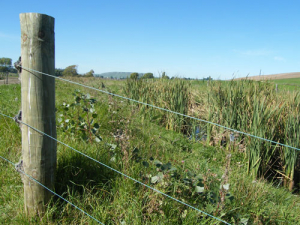Editorial: Happy days
OPINION: The year has started positively for New Zealand dairy farmers and things are likely to get better.
 New freshwater reforms will result in 56,000 km more fences protecting New Zealand waterways from stock.
New freshwater reforms will result in 56,000 km more fences protecting New Zealand waterways from stock.
New freshwater reforms will result in 56,000 km more fences protecting New Zealand waterways from stock – enough to go round the world one and a half times, says Primary Industries Minister Nathan Guy.
The new rules on stock exclusion are part of the Government’s plans announced today setting a target for 90% of rivers and lakes to be swimmable by 2040.
“Farmers have made huge progress in recent years to improve their environmental practices and this will be another important step forward. Dairy farmers have already voluntarily fenced off over 24,000km of waterways,” says Guy.
“We know that stock standing in or regularly crossing waterways can do significant damage. While dairy farmers have voluntarily fenced off around 96% of their waterways, we want to extend this to other types of farms as well,” says Guy.
The proposed national regulation would ensure that dairy cattle, beef cattle, pigs and deer are kept out of waterways.
He says we need to ensure the changes are practical for farmers, so the exclusions would be implemented in a staged process starting this year through to 2030, depending on the stock type and land slope.
“There are long term benefits for the primary industries and wider economy from these reforms. Overseas markets and consumers increasingly demand a strong environmental performance over and above regulatory requirements. In this context, protecting New Zealand’s natural advantage has never been more important.
“No single organisation or group is solely responsible for improving our water quality. Meeting the target will take a collective effort, but the primary industries have a key contribution to make.”
In the meantime, the Ministry for Primary Industries continues to work with the primary sectors to invest in good ideas which promote environmental best practice. One example is the Farm Systems Change program, which identifies high preforming farms and uses farmers’ networks to spread their knowledge.
Another is a major programme under the Primary Growth Partnership, called Transforming the Dairy Value Chain. Under this programme effluent management systems have been improved, and every region now has a riparian planting guideline developed in conjunction with regional councils.
The World Wide Sires National All Day Breeds Best Youth Camp Best All Rounder plaudit has become family affair, with 2026 Paramount Cup winner Holly Williams following in her sister Zara's footsteps.
DairyNZ is giving New Zealand farmers a unique opportunity to gain hands-on governance and leadership experience within the dairy sector.
Herd improvement company LIC has posted a 5.2% lift in half-year revenue, thanks to increasing demand for genetics.
According to the latest Fresh Produce Trend Report from United Fresh, 2026 will be a year where fruit and vegetables are shaped by cost pressures, rapid digital adoption, and a renewed focus on wellbeing at home.
The Roar is a highlight of the game hunting calendar in New Zealand, with thousands of hunters set to head for the hills to hunt male stags during March and April.
OPINION: The past few weeks have been tough on farms across the North Island: floods and storms have caused damage and disruption to families and businesses.

OPINION: Meanwhile, red blooded Northland politician Matua Shane Jones has provided one of the most telling quotes of the year…
OPINION: This old mutt has been around for a few years now and it seems these ‘once in 100-year’ weather…